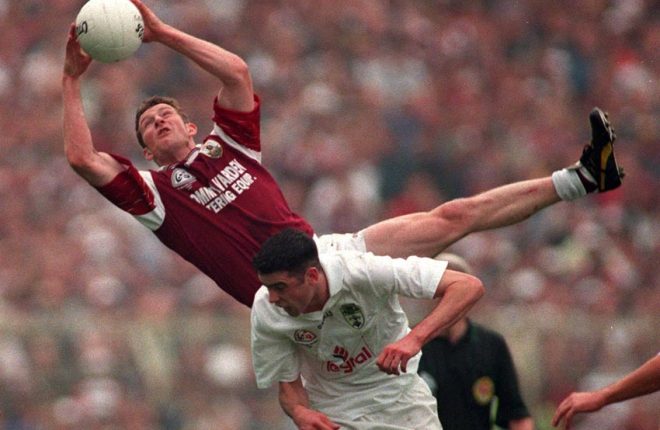
You need a certain type of training to maintain intensity.
What about that Game of Thrones season finale? Intense stuff. Almost as intense as the Monaghan and Donegal game on Saturday night!
The house was shaking all the way in Tyrone after that hit between Murphy and Wylie! Maybe it’s because we’re brought up playing it, but I think we sometimes under estimate how physically demanding Gaelic Games are. A friend of mine from England messaged me after watching a game at the weekend in sheer disbelief at the levels of fitness required compared to the more pedestrian soccer he was used to. Maybe if England had borrowed a little of the Ulster Championships intensity they’d still be in the Euros!
He made comment that from the first minute to the last everything was done with pace. At elite level, our top players essentially sprint an accumulation of 12km over 70 minutes. That’s pretty impressive, never mind when you take into account that the sprint is a secondary action to whatever is going on in the game, be it chasing down a tackle or bursting up the field on the ball.
Having the ability to sustain that high level energy is often the difference between winning a losing. The team that finishes strong is more often than not the team that wins.
I’ve watched a few club games this year and one thing that stands out when a county player is on the field isn’t how much stronger they are technically, but how far ahead they are physically.
When county players step down to club level they seemingly have another gear compared to the rest of field, and it’s always in the final stretch when others legs begin to get weary where their top level conditioning shines through. So how can you improve ‘that last ten minutes’?
Unfortunately there is no magic formula. The 400m sprints that you’ve been doing with your club are one of, if not the most efficient way of building up your endurance. Because our game is one of “sprint, rest, sprint, rest, repeat” following that pattern in training will give you the most obvious improvements. In saying that, you aren’t limited to doing only this.
I’m really intrigued what other top sports stars do to achieve their elite levels of fitness. I try and pluck different ideas and methodologies from other sports and see if it can be applied to GAA training with similar success.
Gareth Bale, universally accepted as one of the fasted, and fitness soccer players on earth attributes his lung power to being a cross country runner in his youth.
Having worked with a number of players through the year, the few who have been able to consistently maintain including one long run per fortnight have been the ones who have seen their aerobic performance improve the most.
Sometimes to achieve our goals we must go above and beyond the norm. By finding the time to tackle an off road run regularly you will see cardiovascular improvements.
I’m lucky to have had the chance to work with a range of footballers throughout the season and have seen how different types of training have had varying improvements on all aspects of fitness.
The implementation of Olympic Lifts to training programs has helped immensely with the sprint speed of a lot of my players, and through programming them into Crossfit style MetCon circuits the recovery times post sprint have also significantly improved.
Word of warning though – Don’t worry about the chimney until the foundations are in, i.e unless you can maintain a high intensity for the first 50 minutes of the game, don’t get bogged down by what you can do for the last 10.
For more training and nutritional advice you can catch me on Snapchat, Instagram, Twitter and Facebook by simply searching PGthePT, or go to www.pgthept.com and sign up to my email club to receive some top notch info every Monday, Wednesday and Friday!
comment@gaeliclife.com
Receive quality journalism wherever you are, on any device. Keep up to date from the comfort of your own home with a digital subscription.
Any time | Any place | Anywhere











